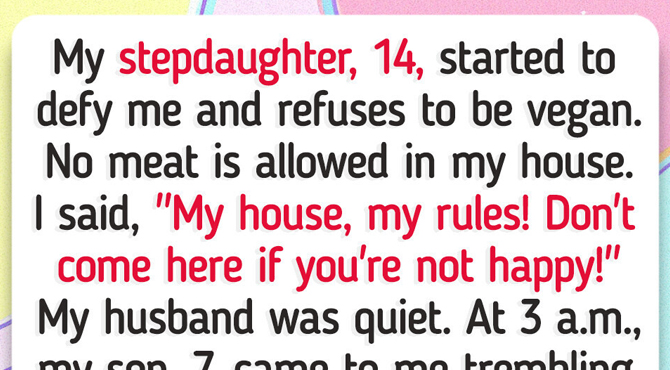Blended families often encounter unique hurdles, where minor tensions can quickly spiral into major conflicts. When Trish requested that her household honor her commitment to a vegan lifestyle, it unexpectedly sparked a heated exchange. Her husband’s reaction took her by surprise, leaving her emotionally shaken and uncertain about what to do next. Seeking clarity and support, Trish turned to us for help navigating this delicate situation.
This is Trish’s letter:
Hello,
No meat is allowed in my home. My stepdaughter, 14, started to defy me and refuses to be vegan. I said, “My house, my rules! Don’t come here if you’re not happy!” My husband was quiet. At 3 a.m., my son, 7, came to me trembling.
Imagine my horror when I found out that my husband went to my son’s room, kissed him goodbye, and then left.
I checked the closet, and he had taken his clothes, packed his things. I called, and he said that he needs to be away from me for some time. He called me a “monster” and said that this house is also my stepdaughter’s house, and I have no right to impose anything on her.
I still think that I didn’t do anything wrong here. My stepdaughter is spoiled, and I have the right to impose any rule I want in my own home.
Do you think I was wrong to act this way?
– Trish
Thank you for sharing your story — it’s clear that this situation has deeply affected your family. Whether or not you feel you were wrong, the emotional distance and conflict are now very real, and the challenge now is how to move forward thoughtfully and constructively. Here are four pieces of advice that could help you.
Acknowledge That Shared Spaces Mean Shared Power
Even if you believe you’re justified in setting household rules, your husband’s comment — “This house is also my stepdaughter’s house” — reveals that he feels unheard and possibly disrespected in family decisions. Consider that this might not just be about meat — it’s about feeling excluded from authority in a shared home.
Action: Invite your husband to a calm conversation (ideally in person) and propose creating shared household expectations that reflect both of your values. Not a surrender — a collaboration.
Use Your Son’s Reaction as a Compass
Your 7-year-old came to you trembling at 3 a.m. That’s not just about your husband leaving — it’s about your son feeling emotionally unsafe. This isn’t only an adult disagreement anymore; it’s something your children are absorbing.
Action: Focus less on who’s “right” and more on restoring emotional security. Reassure your son, validate his fear, and prioritize rebuilding a calm home — because emotional fear in children is a long-term consequence of family instability.
Draw a Clear Line Between Boundaries and Control
Saying “Don’t come here if you’re not happy” to a 14-year-old who lives with you may have felt like laying down the law — but to her, it likely felt like rejection. Being vegan in your own home is a valid choice. Imposing it as an absolute on others, especially a stepchild navigating loyalty, grief, or identity, is likely to backfire.
Action: Introduce zones or compromises — e.g., “No meat in the kitchen, but if you order something, eat it outside or in your room.” This gives her space without changing your values.
Stop Framing This as ‘I Did Nothing Wrong’ — And Start Asking What Needs Repair
Staying firm in “I did nothing wrong” may protect your pride, but it won’t bring your husband or stepdaughter home. Whether your actions were justified or not, the emotional damage is real.
Action: Reflect not just on the rule, but on the delivery. Apologizing doesn’t mean saying you were wrong to be vegan — it means saying, “I’m sorry I made you feel unwelcome in your own home. That wasn’t my intention.” That alone could open a door that’s now shut.
